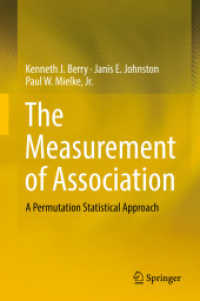基本説明
New in paperback. Hardcover was published in 2005. The procedural mechanism of environmental assessment is analysed with several contemporary projects as case studies.
Full Description
Environmental Assessment is an inherently interdisciplinary mechanism which is concerned with the input and quality of information about the likely effects of development upon the environment. It is a useful tool for examining aspects of the relationship between law, governance, and the regulation of decision making, which have been central to the development of environmental law. In this volume, the procedural mechanism of environmental assessment is analysed. The author argues that, notwithstanding its procedural nature, environmental assessment is highly material to the outcome of a decision. A major focus of this analysis is the enhanced role of the developer in shaping the outcome of a decision by assuming responsibility for providing information on which a decision will be based, in accordance with a broader agenda of expanding the roles and responsibilities of participants in environmental decision making.
The author draws upon several contemporary projects as case studies of assessment: a global port, an offshore windfarm, a flood defence strategy, and a recreation centre. In analysing these sites of decision making from a legal perspective, the author touches upon the key determinants of environmental assessment: discretion, the significance of environmental effects, alternative options, and participatory rights. Finally, the volume looks to the future development of environmental assessment: as an avenue for protest, and, alternatively, as a standardized component of international contracts for development.
Contents
Table of Cases ; Table of Legislation ; Acknowledgements ; Preface ; 1. Introduction ; 2. Tracking Environmental Assessment ; 3. Prediction: Environmental Assessment as Science, Art, and Law ; 4. Ecologization of Governance through Environmental Assessment ; 5. Participation ; 6. Regulation of Decision Making ; 7. Protest ; 8. Standardization ; 9. Conclusions ; Bibliography








